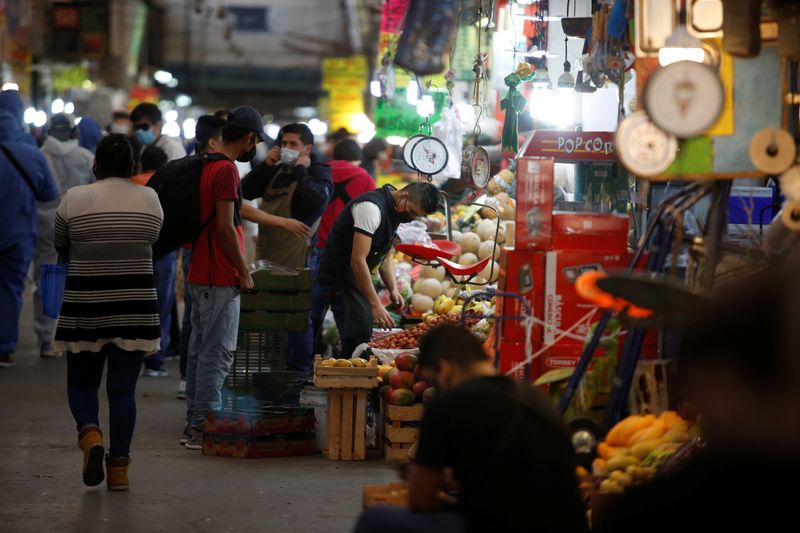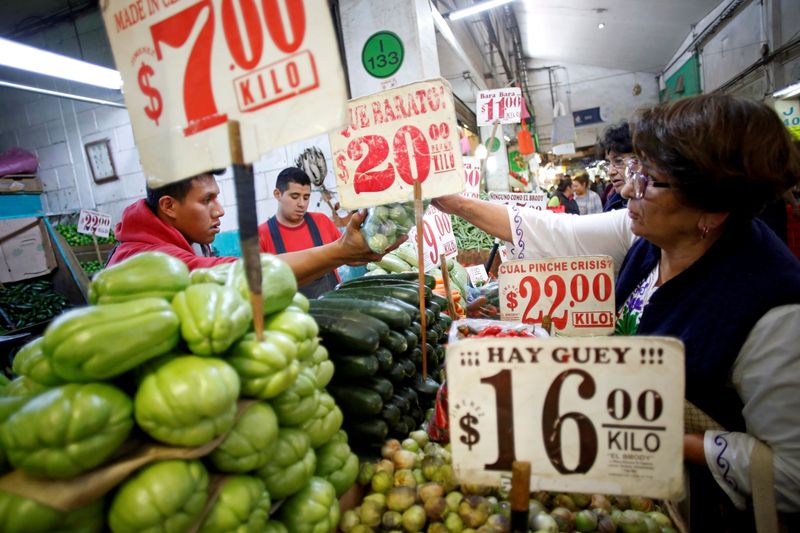By Noe Torres
MEXICO CITY (Reuters) - Every day, thousands of Mexicans crowd a massive food market that is a linchpin of the capital's food supply, though it sits at the heart of a major hotspot for the virus.
Mexico City's sprawling Central de Abasto market, stretching across an area equivalent to about 327 football pitches, poses a major headache for officials trying to keep food supplies flowing without magnifying the spread of the coronavirus.
It is a daunting task in a market known to attract about a half a million people a day in normal times, according to figures from officials in Iztapalapa, a neighborhood with the highest numbers of coronavirus infections in Mexico.
In addition to shoppers and wholesale buyers who throng the market at night to supply retail outlets in the metropolis, another 100,000 workers typically cram the corridors lined with sacks of potatoes, rice and boxes of bananas.
Local officials have not detailed how many visitors the market is receiving during the quarantine, but the market's organizers say vehicle traffic has fallen by about 30%.
In early May, the capital's government included the shopping complex in a list of 89 areas deemed to have "high-risk of contagion" as part of efforts to prevent an outbreak.
Still, completely shutting the market that serves a sizeable swath of Mexico's 25 million people is not an option, said Mexico City Mayor Claudia Sheinbaum, because it would devastate the regional food supply.
"Central de Abasto cannot be closed,"Sheinbaum said late last month. "We are taking very strict measures so that as few people as possible go."
Unlike those living in the leafy upscale areas of Mexico's cosmopolitan capital, the drivers, cleaners and vendors in the working class Iztapalapa area say they have no choice but to risk the virus.
"The government says to stay in quarantine. So how are we going to eat?", asked Fernando Torres, one of the thousands of people who works in the market.
"I know that I am in the hands of God," added Torres, sporting a cloth mask over his face. "If God says, 'The coronavirus will take you,' it will take me. But I try to take care of myself."
With about 2,500 confirmed cases and more than 200 deaths, Iztapalapa accounts for about a fifth of the total number of infections and deaths related to the virus in Mexico City, the epicenter of the pandemic in the country.
Experts attribute the rapid spread of the disease in part to the location of the neighborhood, the most populous in the capital, connecting the center of the sprawling city with the dense suburbs of the state of Mexico.
Residents are further handicapped by poor public services, such as scarcity of drinking water. More than a third of the population lives in poverty in the city borough, according to government data.
Two of the four public hospitals serving COVID-19 patients in Iztapalapa were saturated on Saturday, according to government data. Area funeral homes and crematoriums have also said they were getting slammed.
Reuters made repeated requests for an interview with Clara Brugada, mayor of the Iztapalapa area, but she was not made available in time for publication.
"CUTTING THE TRANSMISSION CHAIN"
Due to the coronavirus, the market is operating at 85% of capacity. It typically receives more than 15,000 products every day from all over the country in more than 60,000 cargo vehicles, officials say.
The decision to tighten surveillance came just after market authorities acknowledged about 25 people had been infected and reported two deaths related to the virus at the facility, where about $9 billion changes hands each year.
As part of the precautionary measures, children and pregnant women are prohibited from entering, while health personnel have begun to carry out COVID-19 tests. Hundreds of police officers and other public employees are stationed to measure visitors' temperatures.
"What we are trying (to do) is cut the transmission chain," said Javier Serna, health officer at the Iztapalapa mayor's office.
However, Serna said 34 additional cases of coronavirus were detected last week after conducting 450 tests among market personnel.
In the neighborhood around the market, dozens of shops remain open and residents can be seen walking without face masks -- in contrast to the desolate streets in more affluent areas of the capital.
Angeles Medina, 33, lost her job in a plastic factory after the coronavirus outbreak, and now sells tacos and coffee outside a metro station 10 minutes from the market.

"I am afraid of getting infected or bringing an infection to my house, but we have to work," Medina said.
